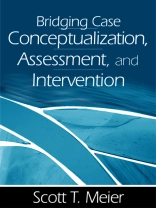Many training programs assume that if students receive separate courses in research design, assessment, and counseling, they will naturally integrate this information into their work with clients. Unfortunately this mode of science-practice integration often fails.
Bridging Case Conceptualization, Assessment, and Intervention presents a new approach to the integration of science and practice in clinical work. Author Scott T. Meier systematically connects case conceptualization, assessment, and analysis of intervention effects. This integrative approach differs from traditional methods of teaching counseling in its emphasis on the inclusion of assessment data in the intervention process.
This innovative, transtheoretical volume examines
- Key elements of conceptualization, assessment, and analysis
- The role of structured feedback in the clinical process
- Outcome elements for multiple and selected problems
- Assessment methods and psychometric principles
- Graphical, qualitative, and quantitative analytic techniques
- Numerous case studies
- Possible future directions for science-practice efforts
Bridging Case Conceptualization, Assessment, and Intervention provides an effective method for thinking about, organizing, and focusing on the key elements of counseling processes and outcomes. By integrating case conceptualization and assessment data into intervention decisions, students and clinicians will understand when and why counseling is ineffective and have a basis for adjusting treatment to improve clinical outcomes.
With its emphasis on concepts and procedure, Bridging Case Conceptualization, Assessment, and Intervention is intended as a manual for students in psychology, psychiatry, social work, or counseling and practicing psychotherapists, psychiatrists, or counselors.
Table des matières
Preface
1. Introduction
Building Upon Traditional Nomothetic Approaches
Assumptions and Values
Basic Tasks
2. Case Conceptualization
What Information is Needed?
Sources of Information for Conceptualization
Creating a Case Conceptualization
A Conceptualization Example
Treatment Failure
Summary and Cautions
3. Clinical Assessment
General Measurement Principles
Types of Assessments and Tests
Ruling Out Methods
Units of Measurement
Creating a Clinical Assessment
Begin With the Case Conceptualization
Explicate Constructs
Measure Behaviors
Collect As Much Data As Feasible
Summary and Cautions
4. Analyses of Clinical Data
Analyses Related to Outcome
Analyses Related to Conceptualization
Analyses Related to Assessment
Data Patterns
Computer Systems
Summary and Cautions
5. Alternative Explanations
Issues in Case Conceptualization
Issues in Clinical Assessment
Issues in Analytic Judgements
Summary
6. Possible Futures
How Change Might Occur
Obstacles to Change
Research Into Science-Practice Integration
References
Index
A propos de l’auteur
Scott T. Meier is Professor and Co-Director of Training of the Program in Counseling/School Psychology, Department of Counseling, School, and Educational Psychology, University at Buffalo. His major research and teaching areas focus on psychological assessment and testing (particularly outcome assessment), research methods (particularly program evaluation), and counseling skills (particularly the integration of case conceptualization and assessment with intervention). Meier is the author or co-author of 4 books (including the Elements of Counseling) and 40 journal articles. He is a licensed psychologist who received his Ph D in Counseling Psychology from Southern Illinois University, Carbondale in 1984.












